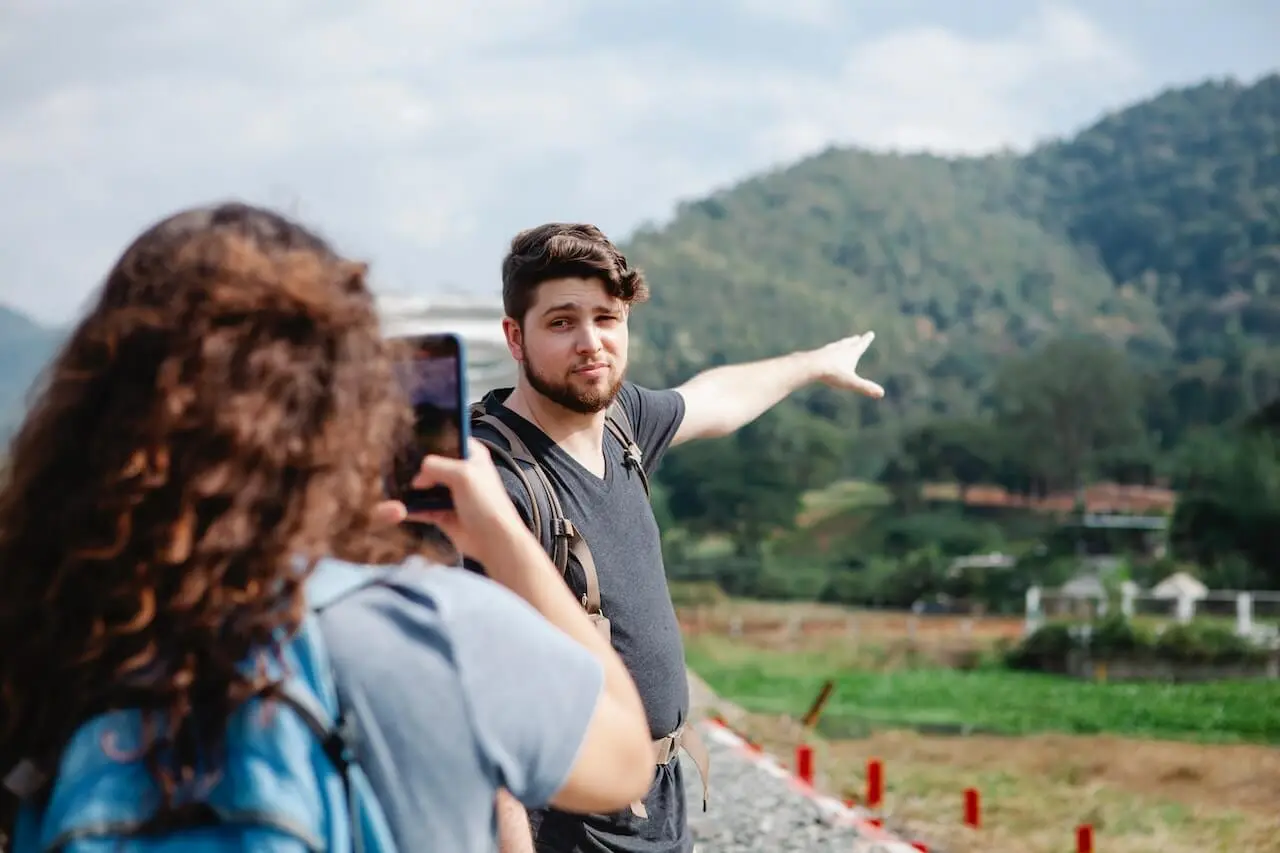Originally published August 8, 2023 , updated on July 2, 2024
The COVID-19 pandemic had a significant impact on the tourism industry. Many businesses were struggling to recover from the economic fallout. According to the World Travel & Tourism Council, the industry experienced a 50.4% decline in global GDP contribution in 2020. With vaccinations becoming more widespread and tourism restrictions lifting, there’s hope for recovery.
Travel content marketing is a powerful tool that brands can use to drive business. Compelling copy that resonates with potential customers can drive awareness, engagement, and revenue. Look no further than Airbnb’s “Live Anywhere on Airbnb” campaign for a success story. This effective travel content marketing campaign encouraged remote workers to book longer stays. It saw such great audience reception that the slogan is now part of the company’s regular messaging.
On that note: Let’s explore seven innovative travel content marketing strategies to help your brand make the most of 2023. We’ll also dig into the benefits of hiring travel content writing services to ensure you get the best results.
Innovative Travel Content Marketing Strategies for Brands in 2023

1. Design a Functional and Compelling Website Experience
When it comes to travelling, potential customers often seek an escape from their daily routines. The content writing you do for your travel website needs to provide that escape with ease. Navigation should be simple and intuitive.
It should allow visitors to find what they’re looking for in the least number of steps. It’s surely not ideal for visitors to spend too much time searching for information or navigating a confusing layout. If they do, they might get frustrated and leave the site without taking any action.
Moreover, content writing for your travel website needs to be engaging and persuasive. Highlight the best parts of travelling, such as beautiful destinations and unique experiences. This can help visitors feel inspired and excited about booking a trip.
You can also address common hesitancies or concerns, such as safety or cost, through your copy. This can alleviate potential customer fears and persuade them to take action in time. Provide clear calls-to-action (CTAs) throughout the website. Something as simple as “Book Now” or “Learn More” in the right spot can help increase lead generation and drive conversions.
2. Opt for Dynamic Creative Optimisation
Dynamic creative optimisation (DCO) is a new tool gaining popularity in tourism content marketing. DCO involves monitoring users’ browsing behaviour and preferences. This allows brands to specifically send highly personalised ads to customers by tailoring the ad in real time.
With DCO, you can optimise your campaigns by showing potential customers the most relevant and compelling ads. Users are more likely to interact with ads that speak directly to their interests and needs. This can eventually increase engagement and conversion rates.
Travel content writing services are experts at analysing user data. They look into factors such as search history, website activity, and demographic information. Based on this, these services serve ads that are more likely to convert users into customers.
For example, they’ll share summer flight deals with a user who has shown interest in beach destinations before. For someone who Googled urban retreats, travel content writing services can share ads for city hotels. This level of personalisation can help you stand out in a crowded marketplace and drive business growth.
3. Build an Omnichannel Marketing Strategy
In modern digital marketing, consumer touchpoints extend far beyond traditional advertising and content writing for travel websites. Travel content marketing now includes podcasts, social media, and virtual reality. Tourism brands must consider new and creative avenues to particularly reach prospective customers.
Using multiple platforms effectively helps to build an omnichannel marketing strategy. This way, you can reach customers wherever they are and create a cohesive brand experience. An omnichannel approach creates a communication ecosystem that reinforces your brand’s core message. As a result, this can help maximise the efficiency and influence of your marketing campaigns.
For instance, the Singapore Airlines mobile app seamlessly fuses online and offline experiences. Their integrated platform allows travellers to book flights and arrange rides to the airport. Users can even select in-flight entertainment and reading material before boarding.
An omnichannel marketing strategy like this can help you build stronger customer relationships. Different channels can surely help you create a unique, engaging experience for each customer. This can increase loyalty and repeat business as customers feel more connected to your brand and its values.
4. Prioritise Consistent Blogging
Travellers spend around four weeks researching their desired destination. This undoubtedly makes blogging an essential component of content writing for travel websites. It provides customers with relevant information that addresses their needs and interests.
It also helps you build a relationship with your audience, where your brand is their go-to resource for answers. Consistency is key here, enabling you to build trust with your audience. It also demonstrates your expertise and commitment to providing them with valuable information.
Regular blogs can be a great addition to the content writing on your travel website. It can drive organic traffic, increase engagement, and boost conversions. Moreover, regular tourism blog content writing is a powerful way to improve your website’s search engine optimisation (SEO).
By including keywords relevant to your target audience, your website will rank higher in search engine results pages. This makes it more discoverable to new customers and markets.
5. Make the Most of Video Content
Videos have particularly become essential to travel content marketing. It is undoubtedly an engaging medium that can transport your audience to your destination, making them feel like they’re already there. Videos can help you connect with your audience and drive engagement. You create your own videos or rely on consumer-generated and influencer videos.
Consumer-generated videos are obviously an excellent way to showcase the authenticity of your brand. It is likely to appear organic, making it more appealing to your target audience. Influencer marketing videos will reach a wider audience and create awareness about your brand accordingly. An effective tourism content writing and marketing strategy should include a mix of both.
Videos also fit well into an omnichannel travel content marketing strategy. You can actively promote your videos on social media accounts, through email, and also on your brand’s website. You can better engage with your audience by integrating videos into your marketing efforts.
Tourism content writing services can help you create and distribute high-quality, compelling videos. With their expertise and access to the latest technology, we can help you create videos that resonate deeply with your audience.

6. Choose the Right Performance Metrics
When it comes to tourism content writing, choosing the right performance metrics is crucial. Key performance indicators (KPIs) measure the effectiveness of your marketing efforts. Most brands only check for last-click conversion rates.
But, looking at the entire customer journey and all touchpoints that lead to a sale is essential. You can track website traffic, social media engagement, and bounce rates, amongst other KPIs. This gives you a more accurate understanding of how your brand is performing.
To ensure that you are measuring the right metrics, it’s important to define your goals and objectives upfront. Are you increasing organic traffic, driving more bookings, or boosting social media engagement?
Once you have a clear idea of your goal, you can set measurable targets and use data to track your progress. This helps you make informed decisions and optimise your tourism content writing to improve your results.
7. Craft a Narrative around Your Brand
Stories have the power to connect with a customer’s head and heart, creating a memorable and long-lasting impression. It particularly allows you to weave together your brand with the unique experiences, history, and culture of different destinations. With this, you can create an immersive and captivating story that resonates with your audience.
Storytelling expands the limits of content writing for travel websites, social media accounts, and other platforms. According to a recent survey, 65% of respondents believe personal, local stories are an effective tourism content writing strategy.
A little success story from the Faroe Islands, an archipelago off the coast of Denmark, is evidence. Their marketing team wanted to increase tourism and get noticed on Google. But they only had a small budget, so they pivoted to what was unique to their destination. They harnessed a 360-degree camera to the back of over 80,000 sheep running wild around the island, creating a campaign called SheepView.
This unique approach gained media attention across Europe and the USA, reaching over 3.5 billion people. The success of the campaign lies in its authenticity. They focused on a local story, and that’s what subsequently resonated with people over the world.
It pays to incorporate storytelling techniques into your tourism content writing strategy. It allows you to forge deeper connections with your target audience. Travel content writing services can undeniably share memorable stories through social media, blogs and other platforms. They can help build a sense of excitement and anticipation around your brand. Also, they can inspire potential customers to book their next experience with your brand.
Benefits of Hiring Travel Content Writing Services
Are you a tourism brand looking to make a mark in the competitive industry? Do you want to build up your business in the post-pandemic era? It’s surely worth considering the benefits of hiring travel content writing services.
These services can handle every aspect of your tourism content writing strategy. They can do everything from audience research to strategy creation and distribution. By partnering with a professional agency, you can leave the heavy lifting to the experts and therefore, focus on other aspects of growing your business.
Working with travel content writing services gives you access to experience and expertise. They stay on top of industry trends and provide innovative solutions that help your brand stand out in a crowded market. These services can also help you track your results and refine your strategy to ensure you get the best possible return on investment.
Creating a successful travel content marketing campaign requires significant time, talent, and resources. You can also save time and resources by partnering with travel content writing services. When you work with an agency, you can leave the details to them and focus on other important aspects of your business.

This can free up your time and resources to help grow your brand in other areas, such as customer service or product development. Partnering with travel content writing services is a wise investment. We can help you stay ahead of the competition while achieving your 2023 business goals.
Connect with Goodman Lantern for Travel Content Writing Services
At Goodman Lantern, we understand that every brand is unique. So we tailor our services to meet your distinct needs. Our team of native English writers worldwide can help you create unique marketing campaigns that resonate with your target audience.
Our travel content writing services include everything from content writing for travel websites to social media management to paid advertising. So with our help, you can create a cohesive and effective travel content marketing strategy. One that drives results and boosts your returns.
So why wait? Contact us today to learn more about how we can help you achieve your travel content marketing goals.
Post Views: 768


















